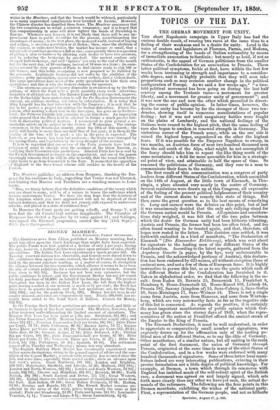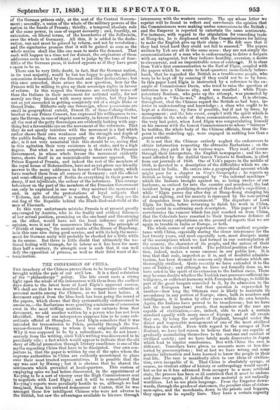TOPICS OF THE DAY.
THE GERMAN MOVEMENT FOR UNITY.
TAE short Napoleonic campaign in Upper Italy has had the curious double result, of rousing two races at the same time to a feeling of their weakness and to a desire for unity. Loud is the voice of orators and legislators at Florence, Parma, and Modena, for a strengthening of the bands of Italian nationality by means of immediate annexation to Sardinia; but nearly as loud, if not as enthusiastic, is the appeal of German politicians from the smaller States of the Confederation for an annexation to Prussia. These latter political symptoms, feeble at first, have within the last few weeks been increasing in strength and importance to a consider- able degree, and it is highly .probable that they will soon take proportions such as may occasion another change in the political configuration of Europe. As we said a few weeks ago,* "a two- fold political movement has been going on during the last half century among the Teutonic races—a movement for greater liberty, and a movement for greater unity of government ' ; and it was now the one and now the other which prevailed in direct- ing the course of public opinion. In latter times, however, the desire for unity has become by far the stronger of these two ten- dencies, showing itself in numerous manifestations of popular feeling ; but it was not until sanguinary battles were fought on the plains of Lombardy, and the national feelings of the Italians were roused to the highest pitch, that the same feeling of race also began to awaken in renewed strength in Germany. The victorious career of the French army, while on the one side it raised the highest hopes, engendered on the other the highest fears. If it was possible for the Emperor Napoleon to sweep, in. two months, an Austrian force of near two hundred thousand men from the soil south of the Alps, what might he not accomplish if the fancy should take him to repeat the like thing north of the
i same mountains ; a field far more accessible for him in a strategi- cal point of view, and attainable in half the space of time. So reasoned the politicians of Germany, and they rose to a man to communicate their fears to the nation.
The first result of this communication was a congress of party leaders from different States of the Confederation, which assembled on the 14th of August, at the little town of Eisenach, in Thu- ringia, a place situated very nearly in the centre of Germany. Several resolutions were drawn up at this Congress, all expressive of the feeling of the present political helplessness of their country and of the earnest desire to remedy this state of things. But then came the great question as to the beat means of remedying it. Long and earnest were the debates on this point, but at last it was unanimously decided that the only safe rallying stand for the German nation would be Prussia. All opinions and considera- tions duly weighed, it was felt that of the two poles between which the desire for German unity had been hitherto vibrating, Austria and Prussia, the former had been too often tried, and too often found wanting to be trusted again, and that, therefore, all hopes now rested in the latter. This decision once settled, it was forthwith embodied in a kind of manifesto, " The Declaration of Eisenach " (Die Eisenacher Erklitrung), which was sent about for signature to the leading men of the different States of the Confederation. According to the latest reports, gathered from the Augsburg Gazette (a paper, by the bye, very unfavourable to Prussia, and the acknowledged partisan of Austria), this declara- tion has been endorsed by 625 names, all without exception those of eminent men, and not a few of them of European fame. It is highly instructive to peruse this list, so as to see the quota which each of the different States of the Confederation has furnished to it. Taken in alphabetical order, we find that the following is the re- sult : from Baden 19, Bavaria 25, Brunswick 11, Frankfort 8, Hamburg 8, Hesse-Darmstadt 33, Hesse-Kassel 168, Lubeck 54, Prussia 182, Saxony (kingdom of) 15, Saxe-Coburg 5, Saxe-Gotha 26, Saxe-Meiningen 17, Saxe-Weimar 54. There is not a single name from Austria, none from Hanover, and none from Wiirtem- berg, which are very noteworthy facts as far as the negative side of this list is concerned. As regards the positive, it is certainly the most important manifestation of public opinion which Ger- many has given since the stormy days of 1849, when the repre- sentatives of the nation at Frankfort offered the ancient crown of the Empire to the King of Prussia.
The Eisenach Declaration, it must be well understood, in order to appreciate so comparatively small number of signatures, was expressly drawn up for the affirmation only of the leading po- litical men of the different States, so to say the elite of Germany. Other manifestoes, of a similar nature, but all uniting in the main point of the first document, the union of Germany through Prussia, originated at the same time in many of the other States of the Confederation, and in a few weeks were endorsed with many hundred thousands of signatures. Some of these latter local mani- festoes indeed are very interesting publications, evincing in their precise formulation not a little degree of political knowledge. For example, at Bremen, a town which through its commerce with England has imbibed much of the self-reliant spirit of the British race, a document was agreed on and largely signed, which sets forth more clearly than any other we have yet seen, the actual de- mands of the reformers. The following are the four points in this Bremen manifesto, exhibiting the wishes of the national party. First, a representation of the German people, and not as hitherto
Spectator, August 21, p. 880. of the German princes only, at the seat of the Central Govern- ment ; secondly, a union of hie whole of the military powers of the nation in the hands of Prussia; thirdly, a temporal absolute rule of the same power, in case of urgent necessity ; and, fourthly, an extension, on liberal terms, of the boundaries of the Zollverein, over the whole of Germany. All this, it is added in the decla- ration, can and must be gained by reform, and not by revolution; and the signit,aries promise that it will be gained as soon as the whole nation shall rise like one man to make the demand. That such will happen in a time not far distant, the originators of these addresses seem to be confident ; and to judge by the tone of four- fifths of the German press, it indeed appears as if they have great r eason to be so.
There can be very little doubt, in fact, that the German nation, in its vast majority, would be but too happy to gain the political concessions demanded by the Eisenach and other declarations ; but this once conceded, there arises the new question, how far the Princes will be willing to give up their sovereign rights in favour of reform. In this respect the Germans are certainly worse off than the Italians in their movement for national unity, for not merely are they blessed with many more rulers, but they have not as yet succeeded in getting completely rid of a single Duke or Grand Duke. Hitherto only one Sovereign, whose possessions are small in geographical extent, Ernest IL Of Saxe-Coburg-Gotha, brother to our Prince Consort, has expressed his willingness to va- cate the throne, in case of urgent necessity, in favour of Prussia ; but all the rest of the petty Sovereigns are evidently looking with any- thing but a favourable eye on the movement of the reformers. That they do not openly interfere with the movement is a fact which rather shows their own weakness and the strength and depth of the public feeling, than any sympathy on their part. Perhaps, also, is it not very unnatural that this should be so, seeing that in this agitation their very existence is at stake, and to a high degree. But what is more surprising is that even the Prussian Government, in whose whole favour the movement evidently turns, shows itself in an unmistakeable manner opposed. The Prince Regent of Prussia, and indeed the rest of the members of the royal house of Hohenzollern, have not as yet given one friendly answer to the many addresses in favour of German unity, which have reached them from all corners of Germany ; and the official and semi-official papers of Berlin do everything in their power to damp, if not to:ridieule, the ardour of the reformers. This strange behaviour on the part of the members of the Prussian Government can only be explained in one way : they mistrust the movement ; and, in spite of the protestations of loyal subjects that "Reform, not Revolution" is wanted, they fancy they see the red flag of the Republic behind the Black-Red-and-Gold of the men of Eisenach.
In this very unfortunate mistake Prussia is at present greatly encouraged by Austria, who in the frailty and evident falseness of her actual position, promising on the one hand and threatening on the other, would have not the least influence on public N.,-• opinion, were it not for manoeuvres like these. The principle of "Divide et impera," the ancient motto of the House of Hapsburg, is in this case also doing good service, and with its help the move- ment for German unity will probably be checked for a little while in its course. But there is little doubt that ultimately the na- tional feeling will triumph, for in labour as it has been for more than half a century, its strength now is such that it can well defy the opposition of princes, as well as their fatal want of de-



























 Previous page
Previous page